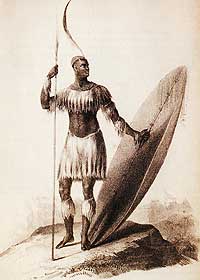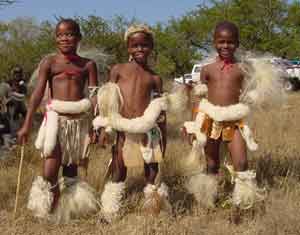-
The Zulu were originally a
minor clan in what is today Northern
KwaZulu-Natal,
founded ca. 1709 by
Zulu kaNtombhela. In
the Zulu language, Zulu means heaven, or
sky. At that time, the
area was occupied by many large Nguni tribes and clans (also called isizwe=nation, people or "isibongo"=clan). Nguni tribes had migrated down Africa's east coast over thousands of years, probably arriving in what is now South Africa in about the year 800 AD
-
The rise of the Zulu kingdom under Shaka: Shaka Zulu was the
 illegitimate
son of
Senzangakona, chief
of the Zulus. He was born circa 1787. He and his
mother,
Nandi, were exiled
by Senzangakona, and found refuge in the
Mthethwa. Shaka
fought as a warrior under
Dingiswayo,
chief of the Mthethwa. When Senzangakona died, Dingiswayo
helped Shaka claim his place as chief of the Zulu Kingdom.
Since that moment, Zulu and Mthethwa formed an alliance.
After Dingiswayo's death, Mthethwa and zulu united under the
kingdom of Shaka. Zulu expansion had a great influence on
the so called Mfecane - the enormous migration of masses
escaping from invasors and affecting all south-eastern
Africa.
illegitimate
son of
Senzangakona, chief
of the Zulus. He was born circa 1787. He and his
mother,
Nandi, were exiled
by Senzangakona, and found refuge in the
Mthethwa. Shaka
fought as a warrior under
Dingiswayo,
chief of the Mthethwa. When Senzangakona died, Dingiswayo
helped Shaka claim his place as chief of the Zulu Kingdom.
Since that moment, Zulu and Mthethwa formed an alliance.
After Dingiswayo's death, Mthethwa and zulu united under the
kingdom of Shaka. Zulu expansion had a great influence on
the so called Mfecane - the enormous migration of masses
escaping from invasors and affecting all south-eastern
Africa.
- Shaka was assasinated by his two half brothers Dingane and Mhlangana.
- After his death Zulu kingdom went on since mid twentieth century when the Zulu king was recognized only as a local chief.
 prodotto di un'accelerata crescita e della trasformazione in organizzazioni
militari delle unitÓ politiche preesistenti, che si coniuga con cambiamenti strutturali nella natura dei rapporti politici, sociali, ideologici ed
economici, fra governanti e governati.
prodotto di un'accelerata crescita e della trasformazione in organizzazioni
militari delle unitÓ politiche preesistenti, che si coniuga con cambiamenti strutturali nella natura dei rapporti politici, sociali, ideologici ed
economici, fra governanti e governati.